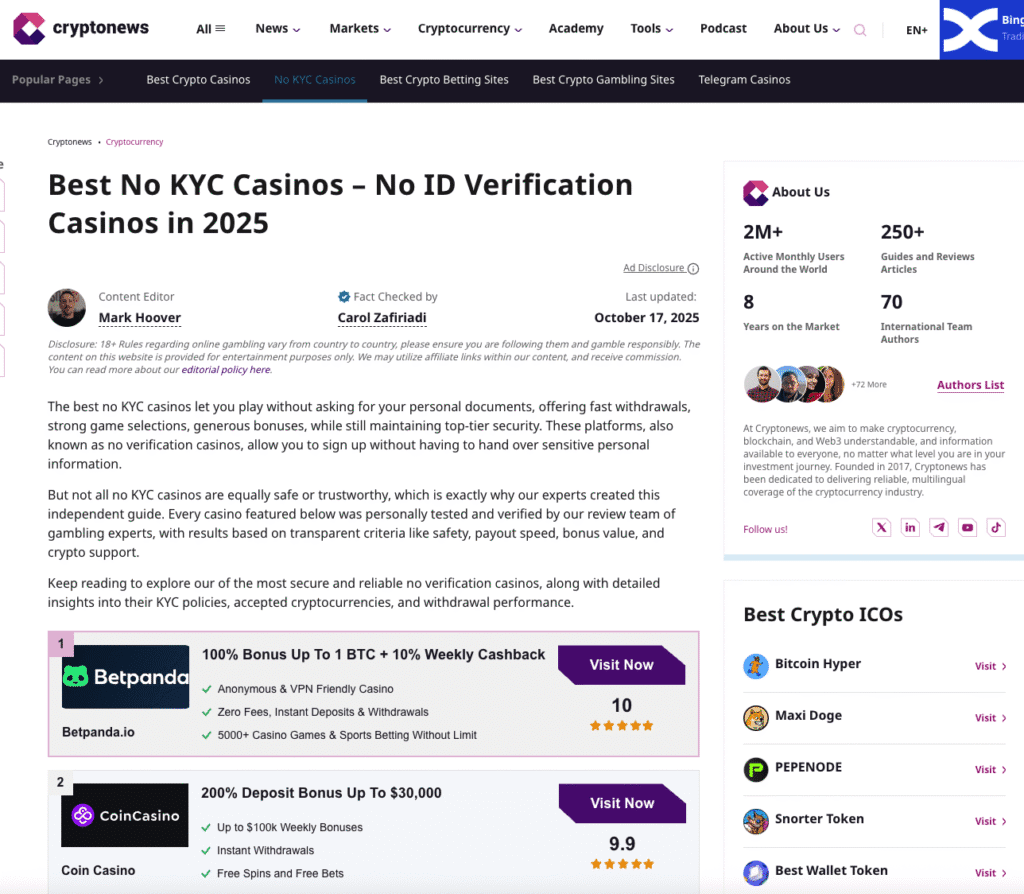Cryptonews’ “No-KYC Casinos” Aren’t What They Claim
VPNCasinos.io Watchdog Report – Volume2
October 2025
If you’ve searched “VPN Casinos” or “no KYC casinos” lately, you’ve probably seen Cryptonews ranking near the top with a sprawling roundup that promises anonymous play, instant payouts, and “VPN-friendly” access. It reads great. It’s also wrong in ways that can cost players money.
We picked a handful of their top picks and read the actual Terms & Conditions, AML pages, and withdrawal rules. What we found is the same pattern we exposed in Volume 1 of this series on CasinoBeats: big SEO sites slap “no-KYC” and “VPN-friendly” labels on brands that explicitly reserve the right to verify you at withdrawal, throttle payouts behind AML hurdles, or outright ban VPN connections. If you haven’t seen part one yet, start here: CasinoBeats Lies to You: The “VPN-Friendly” Casino Scam That’s Costing Players Their Money.
Below are four examples straight from Cryptonews’ list that illustrate the problem.

Betpanda: Marketed as “Anonymous & VPN-Friendly.” Reality: Light-KYC and risk-based checks at cash-out.
Cryptonews’ card claims “Anonymous & VPN Friendly Casino.” Betpanda’s AML statement says it may request KYC “at the point of withdrawal” and uses third-party software to score transactions. That’s not fully anonymous. That’s discretionary KYC. If your activity or amount trips their thresholds, you’re showing ID before you see your money.

Add the Costa Rica base and you get a familiar pattern: easy registration, crypto deposits, and an AML tripwire on payouts. Anonymous-leaning? Yes. Guaranteed no-KYC? No.
Suggested image placement: Screenshot of Betpanda AML clause (highlight on “request KYC at the point of withdrawal”).
Alt text: “Betpanda AML policy clause reserving the right to request KYC at withdrawal.”
Cryptorino: Labeled “Anonymous, VPN-friendly, no-KYC.” Reality: Discretionary KYC even on deposits.

Cryptorino’s own terms include the catch-all everyone glosses over: “We reserve the right to verify your identity at any time… and to lock withdrawals until verification is complete.” There’s also a line about using “additional procedures and means to verify your identity when processing deposits.” When KYC language appears next to deposits, you are nowhere near “no-KYC.”
Suggested image placement: Cryptorino T&Cs (highlight on “additional procedures… verify your identity when processing deposits”).
Alt text: “Cryptorino terms specifying they can verify identity on deposits.”
CasinoPunkz: Promoted as “No KYC.” Reality: KYC at thresholds and at their discretion.

The site allows frictionless signup, but its verification section spells it out: identity checks can be triggered “upon your gambling reaching a certain threshold,” and the operator “maintain[s] discretion to verify your identity at any time,” with the ability to lock your account or prevent withdrawals until verified. That is textbook light-KYC, not no-KYC.
Suggested image placement: CasinoPunkz verification paragraph with threshold language highlighted.
Alt text: “Casinopunkz verification clause allowing KYC at thresholds and discretion.”
Wild.io: Marketed as “No-KYC and VPN-Friendly.” Reality: Verification on first withdrawal is common, with video checks possible.

Wild.io’s terms reserve the right to ask for “any KYC documentation… at any time,” including selfies and even English-language video calls. There’s also an AML wagering rule before a withdrawal is allowed. In practice, many players are verified on the first withdrawal. That is standard KYC on cash-out, not anonymous.
Why this keeps happening
Cryptonews’ page is classic SEO slop: a massive, keyword-stuffed roundup that tries to rank for no KYC, anonymous, VPN casinos, and every adjacent term. Google still rewards domain authority and backlink volume more than content quality, so big networks can dominate with scale and PR instead of verification. The result is harmful labeling: players believe “no-KYC” means no documents ever, then learn the hard way that “discretionary KYC” kicks in exactly when it matters… on withdrawal.
How to protect your bankroll if privacy matters
Read the documents, not marketing blurbs. You’re looking for three lines that decide everything:
• VPN clause: Do they explicitly allow, stay silent, or ban VPN/proxy usage?
• KYC trigger: Is KYC “never,” “only above X,” or “at our discretion at any time”?
• Withdrawal rules: Any AML wagering multipliers or vague “we may delay if suspicious” language?
When in doubt, we’ve already done the legwork. Our live list of tested casinos and books is here: VPNCasinos.io homepage. If you only care about no-ID gameplay, start with No-KYC Casinos. If speed is the priority, check Instant Withdrawal Casinos. Sports bettors: VPN Sports Betting. And for the scoring math behind our ratings, see How We Grade.
What you can expect from this series
We’re going to keep auditing high-ranking “guides” and post the receipts. Not to win a search race, but to stop players getting burned by surprise verification and “operator discretion” clauses. If you want the first report in this series, it’s here again for convenience: CasinoBeats Watchdog, Vol. 1.
Bottom line
Cryptonews’ roundup ranks because it’s big and well-linked, not because it’s accurate. Treat those “anonymous” and “no-KYC” badges as marketing until proven otherwise in the terms and in live testing. If you value privacy and fast payouts, use sources that actually read the documents, test with real VPN setups, and track player feedback.
That’s our entire job. Start with the VPNCasinos.io homepage for the current, tested list, or jump straight to No-KYC Casinos if you want the shortest path to private play.
Frequently Asked Questions (FAQ)
What was wrong with Cryptonews’ “No-KYC Casinos” list?
Our investigation found that several casinos ranked by Cryptonews as “No-KYC” actually reserve the right to request ID verification at any time. In some cases, these same brands – like Wild.io and CasinoPunkz – explicitly mention KYC in their own Terms & Conditions.
Does “No-KYC” always mean completely anonymous play?
Not necessarily. Many so-called “No-KYC” casinos allow you to register and deposit without ID, but will trigger KYC checks at withdrawal or after large wins. That’s why our Anonymity Grade system separates true no-KYC sites from those with hidden verification triggers.
Are KYC checks illegal or unsafe?
No, KYC itself is legal and required for regulated casinos. The problem arises when sites market themselves as “anonymous” while secretly enforcing KYC later. This kind of deceptive marketing can lead to frozen balances or confiscated funds.
Which casinos genuinely avoid KYC?
A few operators, such as Betpanda and Cryptorino, use a light KYC or threshold-based model, but fully anonymous play is rare. You can check our verified No-KYC Casinos list for operators that have passed real VPN and withdrawal tests.
Can I use a VPN at these casinos safely?
Some tolerate it, others don’t. Always confirm before depositing. Our Best VPN Casinos 2025
How does VPNCasinos.io verify casino claims?
We manually read Terms & Conditions, AML/KYC documents, and test each casino with multiple VPNs and real deposits. We also review player feedback from Trustpilot and gambling forums before assigning a score in our Grading Methodology.
Why do big media sites keep publishing inaccurate casino lists?
Because Google’s algorithm ranks them for backlinks and PR reach, not content accuracy. Sites like Cryptonews or CasinoBeats benefit from SEO volume, while independent watchdogs like VPNCasinos.io prioritize facts over affiliate revenue.

Balazs Pal
Balazs is a co-founder of VPNCasinos and a seasoned sports betting analyst with over a decade of experience in the NBA and MLB betting markets.
Having worked on both the sportsbook and affiliate sides of the iGaming industry, he brings deep market expertise and a no-nonsense approach to evaluating crypto betting sites.
Beyond VPNCasinos, Balazs runs FreeCryptoBonus, Coinbettors and The Barrel Zone, a sports betting Discord where he shares data-driven sports betting picks with a dedicated community.




